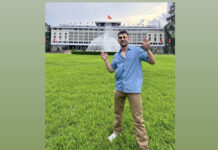Siddiq Wahid
After reading the last edition of this column which argued that “Real resistance must think local, act global”, a friend called to question me about the use of the word “real” in the title. A nuanced reader, he was too polite to say it, but was probably troubled by the hierarchy of resistance implicit in the essay’s title.
The word was a last-minute addition by me, almost frivolous self-criticism. But frivolity can echo mental spontaneity reflecting a genuine political problematic. The questions occupied me for some time. Then it occurred to me that my insertion of the word “real” was an instinctive surfacing of questions about our resistance lingering within me.
At what stage of our resistance are we in? Does venting opinion in social media without influencing reasons of state for its unreason merely justify complacency? When does emotional rhetoric give way to grounded action? When does personal grief cease to be shared voyeurism? When does enraged reaction stop translating into mob action?
The questions are not meant to disparage rhetoric or to decontextualize angry opinion, voyeuristic trend or mob passion.
When we resist, even imprudent reactions to oppression have their reason. And, as we well know, our reactions are directedly proportionate to the quality and quantum of violence perpetrated by raw state power. In this context, understanding stages in resistance helps us to define, hone and articulate it, to take it to the next level. It makes the resistance historically more self-aware, legally more defined and politically more diagnostic. Gilgit, Baltistan, Ladakh and Jammu (the other constituent parts of the disputed State of J&K) may not be at the same stage in the trajectory of political movements, but Kashmir has entered it. And it is a powerful one.
Vocal and overt resistance
The resistance in Kashmir has several layers to it. Of these, the first is the establishment-defined moderate (often a euphemism for “people who think like us”) Kashmiris. In the last thirty years, such “moderates” have become an endangered species, thanks to the efforts of icy governmentality.
It has managed to alienate large swaths of Kashmiri society – from school going children to senior citizens to senior bureaucrats to businesswomen. They bear witness to Delhi’s transition from being biased (the logical outcome of politically cunning) to being prejudiced (the result of ignorance) to being bigoted (the harvest of not wanting to know).
To convince anyone in Kashmiri society today to expect good faith from Delhi will take no less than reversing the country’s (majoritarian driven) domestic doctrine and its (Islamophobia driven) foreign policy of the last thirty years.
The second advance in methodical resistance is the work of the Kashmiri resident and diasporic intellectuals. The young and young-at-heart among them have become a formidable pressure group in South Asia, the United States, Europe and elsewhere. Many are writing books, doctoral theses and academic articles on Kashmir’s history, anthropology, politics and other academic disciplines. Others are writing journalistic editorials with sound polemical analysis and nuanced argumentation.
If they are under 40 years of age, they have known nothing other than military rule and political deceit. On breathing the air of freedom of thought and expression, it is easy for them to bear witness to how Kashmir has been deprived of determining its own future. Their academic work becomes effortless resistance.
It is causing many world capitals to learn that the dispute over the State of J&K is not fully understood. And more immediately, that not all is well in Kashmir. Such work provides a qualitatively different interpretation of the dispute. It is not going unnoticed.
The third aspect of the political maturation of Kashmir is the anger of the politically radical insurgency among its young. It is an anger powered by the knowledge that in recent history scores of smaller nations in the former Soviet Union great state and the experimental post-colonial ones of Indonesia, Sudan and Ethiopia have demanded freedom and won.
In part, these nations have reaped, successfully, the results of an “emerging” (albeit for almost three decades now) new world order. This political youth bulge understands future history as they learn about the Quebecois, Scots, Kurds, Uyghurs, Catalan and other nations that negotiate or agitate for greater political equality and access equity. They are many and they know that they are on the right side of history.
Incremental resistance
However, such vocal segments of society, even combined, are a minority in any resistance against injustice. What of the less outspoken or non-vocal sections of society?
The last installment of this column argued that the time for incremental progress toward the resolution of the conflicted dispute (CBMs, “jobs for youth” and the so-called “peace process”) over Kashmir has passed; that it was time for state to state (so statist) efforts at resolution to accept hard political truths to unravel the tangled web woven by conventional statecraft.
Resolution, we argued, can be expected only with a paradigm shift in idea. This can either be forced or it can evolve. The choice between these options is in the making as we speak.
Meanwhile, resistance will continue in all the forms that we have grown familiar with, including writings and speechmaking, strikes and stone pelting, armed insurgency and unarmed protectors. All of them together, however, are but a small segment of society.
What of the civil society majority, sometimes unfairly called the “silent” majority? Homemakers and teachers, farmers and shopkeepers, academics and NGO workers, journalists and researchers, corporate workers and small business employees, shopkeepers and entrepreneurs. What must they do to resist as they continue to lead their everyday lives?
Even when their lives are illegitimately intruded on, people want to lead normal lives. To sell and buy, teach and learn, read and write, circle families and friends. Governmentality works to intrude in all these arenas, to be omnipresent in the interests of control. It must be resisted even under normal circumstances. But, under conditions of territorial occupation, oppressive power or citizen suppression (whichever is your interpretation of our condition in Kashmir) it must be resisted in the interests of collective self-determination and individual privacy; it must be resisted every day despite the abundant use of state guile.
This last comes in many forms. With propaganda, by telling us that we can be “global” before the “local”. Resist it, because we cannot understand globalism by abdicating localism. By coopting us, to make us employees of governmentality. Literally, so that our livelihood depends on it; metaphorically, so that we feel (irrationally) beholden to it. Reason out of it, because it is not natural. Another guile is to use us as the state’s “assets” in our roles as writers, academics, businesspersons or employees by recruiting us for anti-people projects, to divulge strategies and even to inform. Reject it out of hand, because that is betrayal.
These methods of resistance are slow and long term. But they are a method and a loyal response. Call it the incremental resistance of citizens.









